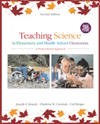 |  Teaching Children Science: A Project-Based Approach, 2/e Joe Krajcik,
University of Michigan - Ann Arbor
Charlene Czerniak,
University of Toledo
Carl Berger,
University of Michigan - Ann Arbor
How Are Scientific Investigations Developed?
Web LinksNational Science Education Standards
(http://www.nap.edu/books/0309053269/html/)
This site for the National Academy Press is a Web site search engine for publications by the National Science Education Standards. These publications outline programs to improve science literacy. |
 |  |  | Studying Sowbugs
(http://www.ag.ohio-state.edu/~ohioline/hyg-fact/2000/2072.html)
Maintained by the Ohio State University, this site contains information on sowbugs and pillbugs, also known as "woodlice." |
 |  |  | Artemis Digital Library
(http://hi-ce.org/sciencelaboratory/artemis)
Artemis is an interface that enables students and teachers to access materials in the Middle Years Digital Library (MYDL). This library currently contains magazine articles, scientific journals, and Web pages. It will be expanded to include library collections, videos, and other materials. |
 |  |  | SciLinks
(http://www.nsta.org/scilinks)
SciLinks is a partnership between several textbook publishers and the National Science Teachers Association (NSTA). It provides students with Internet resources related to specific points in their textbook. |
 |  |  | Skepticism
(http://www.youngskeptics.org)
The Young Skeptics Program is sponsored by the Committee for the Scientific Investigation of Claims of the Paranormal (CSICOP). It provides materials to help students, teachers, and parents apply the methods of skeptical thinking to topics dealing with the paranormal. |
 |  |  | SAVI/SELPH
(http://www.lhs.berkeley.edu/FOSS/SAVI_SELPH.html)
This acronym stands for Science Activities for the Visually Impaired/Science Enrichment for Learners with Physical Handicaps, which is administered by the Lawrence Hall of Science at the University of California, Berkeley. This program was originally designed for people with disabilities, but it has expanded its audience. It provides print and video materials and student learning kits to science classrooms. |
|



 2003 McGraw-Hill Higher Education
2003 McGraw-Hill Higher Education